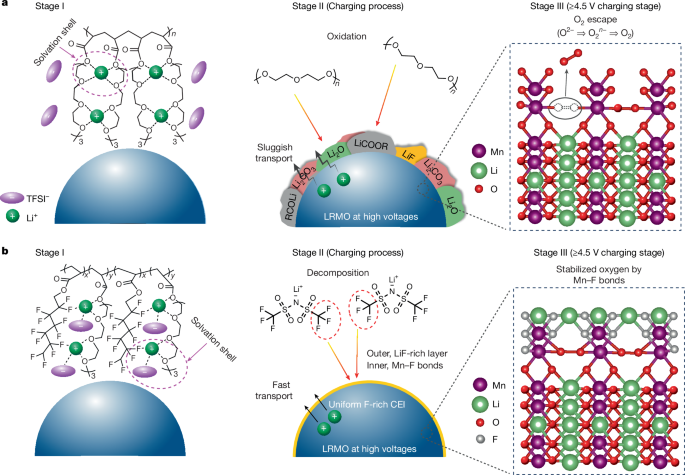Luo, D. et al. A Li-rich layered oxide cathode with negligible voltage decay. Nat. Energy 8, 1078–1087 (2023).
Wang, L., Liu, T., Wu, T. & Lu, J. Strain-retardant coherent perovskite phase stabilized Ni-rich cathode. Nature 611, 61–67 (2022).
Lee, Y.-G. et al. High-energy long-cycling all-solid-state lithium metal batteries enabled by silver–carbon composite anodes. Nat. Energy 5, 299–308 (2020).
Deysher, G. et al. Design principles for enabling an anode-free sodium all-solid-state battery. Nat. Energy 9, 1161–1172 (2024).
Krauskopf, T., Richter, F. H., Zeier, W. G. & Janek, J. Physicochemical concepts of the lithium metal anode in solid-state batteries. Chem. Rev. 120, 7745–7794 (2020).
Ning, Z. et al. Dendrite initiation and propagation in lithium metal solid-state batteries. Nature 618, 287–293 (2023).
Wan, H., Wang, Z., Zhang, W., He, X. & Wang, C. Interface design for all-solid-state lithium batteries. Nature 623, 739–744 (2023).
Tarascon, J.-M. & Armand, M. Issues and challenges facing rechargeable lithium batteries. Nature 414, 359–367 (2001).
Winter, M., Barnett, B. & Xu, K. Before Li ion batteries. Chem. Rev. 118, 11433–11456 (2018).
Zhang, Q.-K. et al. Homogeneous and mechanically stable solid–electrolyte interphase enabled by trioxane-modulated electrolytes for lithium metal batteries. Nat. Energy 8, 725–735 (2023).
Enyuan, H. et al. Evolution of redox couples in Li- and Mn-rich cathode materials and mitigation of voltage fade by reducing oxygen release. Nat. Energy 3, 690–698 (2018).
Seo, D.-H. et al. The structural and chemical origin of the oxygen redox activity in layered and cation-disordered Li-excess cathode materials. Nat. Chem. 8, 692–697 (2016).
Sharpe, R. et al. Redox chemistry and the role of trapped molecular O2 in Li-rich disordered rocksalt oxyfluoride cathodes. J. Am. Chem. Soc. 142, 21799–21809 (2020).
Albertus, P. et al. Challenges for and pathways toward Li-metal-based all-solid-state batteries. ACS Energy Lett. 6, 1399–1404 (2021).
Li, Q., Yang, Y., Yu, X. & Li, H. A 700 W·h·kg−1 rechargeable pouch type lithium battery. Chinese Phys. Lett. 40, 048201 (2023).
Chen, B. et al. Achieving the high capacity and high stability of Li‐rich oxide cathode in garnet‐based solid‐state battery. Angew. Chem. Int. Ed. 63, e202315856 (2024).
Kong, W.-J. et al. From liquid to solid-state batteries: Li-rich Mn-based layered oxides as emerging cathodes with high energy density. Adv. Mater. 36, 2310738 (2024).
Sun, S. et al. Eliminating interfacial O-involving degradation in Li-rich Mn-based cathodes for all-solid-state lithium batteries. Sci. Adv. 8, eadd5189 (2022).
Zhao, Q., Liu, X., Stalin, S., Khan, K. & Archer, L. A. Solid-state polymer electrolytes with in-built fast interfacial transport for secondary lithium batteries. Nat. Energy 4, 365–373 (2019).
Liu, Y. et al. In situ polymerization of 1,3-dioxane as a highly compatible polymer electrolyte to enable the stable operation of 4.5 V Li-metal batteries. Energy Environ. Sci. 16, 6110–6119 (2023).
Zhu, J. et al. Long-cycling and high-voltage solid state lithium metal batteries enabled by fluorinated and crosslinked polyether electrolytes. Angew. Chem. Int. Ed. 63, e202400303 (2024).
Yu, J. et al. In situ fabricated quasi-solid polymer electrolyte for high-energy-density lithium metal battery capable of subzero operation. Adv. Energy Mater. 12, 2102932 (2022).
Yao, N. et al. Identifying the lithium bond and lithium ionic bond in electrolytes. Chem 11, 102254 (2025).
Guo, D. et al. Foldable solid-state batteries enabled by electrolyte mediation in covalent organic frameworks. Adv. Mater. 34, 2201410 (2022).
Liu, T. et al. Origin of structural degradation in Li-rich layered oxide cathode. Nature 606, 305–312 (2022).
Zhang, H., Liu, H., Piper, L. F. J., Whittingham, M. S. & Zhou, G. Oxygen loss in layered oxide cathodes for Li-ion batteries: mechanisms, effects, and mitigation. Chem. Rev. 122, 5641–5681 (2022).
Peng, J. et al. Phase compatible NiFe2O4 coating tunes oxygen redox in Li-rich layered oxide. ACS Nano 15, 11607–11618 (2021).
Fan, W. et al. “Peapod-like” fiber network: a universal strategy for composite solid electrolytes to inhibit lithium dendrite growth in solid-state lithium metal batteries. Nano Lett. 24, 9050–9057 (2024).
Lee, W. et al. Advanced parametrization for the production of high-energy solid-state lithium pouch cells containing polymer electrolytes. Nat. Commun. 15, 5860 (2024).
Hu, J. K. et al. High energy density solid‐state lithium metal batteries enabled by in situ polymerized integrated ultrathin solid electrolyte/cathode. Adv. Funct. Mater. 34, 2311633 (2024).
Wang, H. et al. A strongly complexed solid polymer electrolyte enables a stable solid state high-voltage lithium metal battery. Energy Environ. Sci. 15, 5149–5158 (2022).
Guo, J.-C. et al. A self-reconfigured, dual-layered artificial interphase toward high-current-density quasi-solid-state lithium metal batteries. Adv. Mater. 35, 2300350 (2023).
Xu, P. et al. Solvation regulation reinforces anion‐derived inorganic‐rich interphase for high‐performance quasi‐solid‐state Li metal batteries. Adv. Mater. 36, 2409489 (2024).
Kong, W.-J. et al. Bulk/interfacial structure design of Li-rich Mn-based cathodes for all-solid-state lithium batteries. J. Am. Chem. Soc. 146, 28190–28200 (2024).
Frisch, M. J., et al. Gaussian 16 Rev. C.01 (Gaussian, 2016).
Becke, A. D. Density-functional thermochemistry. III. The role of exact exchange. J. Chem. Phys. 98, 5648–5652 (1993).
Marenich, A. V., Cramer, C. J. & Truhlar, D. G. Universal solvation model based on solute electron density and on a continuum model of the solvent defined by the bulk dielectric constant and atomic surface tensions. J. Phys. Chem. B 113, 6378–6396 (2009).
Reed, A. E. et al. Intermolecular interactions from a natural bond orbital, donor-acceptor viewpoint. Chem. Rev. 88, 899–926 (1988).
Trasatti, S. The absolute electrode potential: an explanatory note. Pure Appl. Chem. 58, 955–966 (1986).

